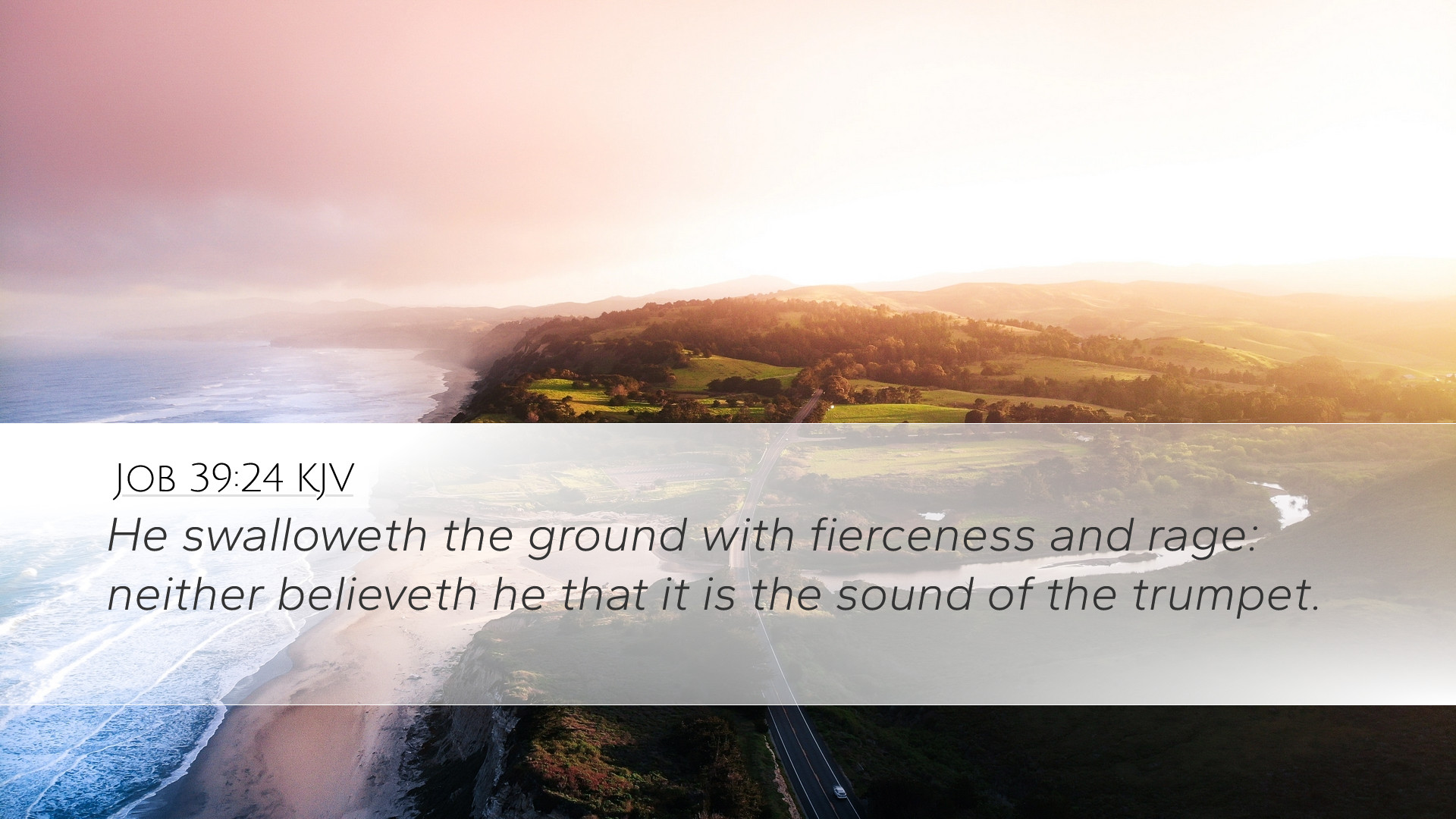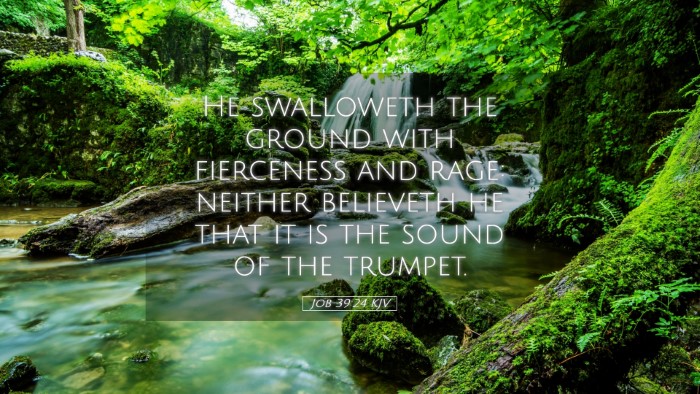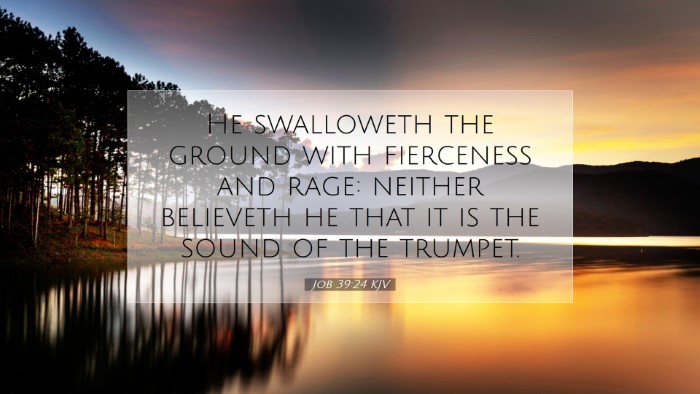Old Testament
Genesis Exodus Leviticus Numbers Deuteronomy Joshua Judges Ruth 1 Samuel 2 Samuel 1 Kings 2 Kings 1 Chronicles 2 Chronicles Ezra Nehemiah Esther Job Psalms Proverbs Ecclesiastes Song of Solomon Isaiah Jeremiah Lamentations Ezekiel Daniel Hosea Joel Amos Obadiah Jonah Micah Nahum Habakkuk Zephaniah Haggai Zechariah MalachiJob 39:24
Job 39:24 KJV
He swalloweth the ground with fierceness and rage: neither believeth he that it is the sound of the trumpet.
Job 39:24 Bible Commentary
Commentary on Job 39:24
Introduction
The verse Job 39:24 states, "In the late afternoon, he devours the prey; and at night, he stalks his prey." This description not only discusses the characteristics of the lion but also illustrates the overarching themes of divine creation and the majesty of God's wisdom in the natural world. Throughout the Book of Job, God highlights the wonders of His creation to challenge Job's understanding of suffering and divine justice.
Analysis from Matthew Henry
Matthew Henry emphasizes the imagery of the lion as it reflects God's sovereignty over creation. The lion is portrayed as a creature of strength that operates according to instinct. Henry notes that:
- The lion does not remain idle but actively hunts; this relentless pursuit exemplifies a larger truth regarding God's providential care and the intricate workings of nature.
- The late hour of the hunt symbolizes both the temptation of the world and the call for vigilance in the spiritual realm.
- Henry observes that despite the lion's power, it operates within the parameters of God's design, which serves to remind the reader of humanity's place in the hierarchy of creation.
Insights from Albert Barnes
Albert Barnes delves deeper into the metaphorical implications of the lion's actions. He explains that the description serves multiple purposes:
- The lion's pursuit of prey symbolizes not only physical might but also the spiritual battle believers face against sin and adversarial forces in the world.
- Barnes draws a parallel between the natural order and moral responsibility, suggesting that just as the lion is diligent in its pursuits, so too must humans strive for righteousness and purpose in their own lives.
- He reinforces the idea that nature reflects the character of God, showcasing both His majesty and the law of the hunt as an essential part of life.
Contributions from Adam Clarke
Adam Clarke offers a scholarly interpretation that highlights the literary context of the verse within the structure of Job. Clarke notes:
- The fierce determination of the lion illustrates the theme of suffering faced by Job, portraying how the trials he endures are part of a larger cosmic struggle.
- Clarke interprets the verse as calling attention to the strength of creation, confronting Job's complaints about God's oversight in his own suffering.
- He stresses the nuance of divine silence amid human affliction, illustrating how the dynamics of predator and prey relate to Job's challenge with his own adversities.
Theological Themes
This verse doesn't merely describe animal behavior but serves as a foundation for several theological concepts:
- The Sovereignty of God: The lion's behavior is orchestrated within the realms of God’s sovereign will. This champions the belief that all creation operates under divine oversight.
- The Complexity of Creation: The intricacy found in natural life points towards a creator who is concerned with both the grand and minute details—reassuring to believers that their lives, too, are seen and cared for.
- Human Experience of Suffering: Job's plight reflects the duality of feeling forsaken by God yet being reminded of His presence through the natural world. This pushes believers to reconcile their faith during hardship.
Practical Applications
For pastors and theologians, Job 39:24 serves as a poignant reminder of the lessons learned in adversity. The natural world provides a rich tapestry through which believers can glean insights regarding:
- Spiritual Vigilance: Just as the lion persists in the hunt, Christians are called to remain vigilant in their spiritual lives, constantly seeking God and their purpose.
- Understanding Suffering: The juxtaposition of the lion's strength with Job's vulnerability encourages believers to find meaning in their pain, reminding them that God remains sovereign even when life seems chaotic.
- Creation's Revelation: The natural world is a testament to God's character, offering profound insights that can inspire modern believers to trust in God's providential care.
Conclusion
Job 39:24 captures the fierce determination of the lion as symbolic of divine truths pertinent to human experience. It calls for reflection on God’s creation and encourages believers to confront their struggles with a renewed understanding of God’s power and purpose. By integrating insights from Matthew Henry, Albert Barnes, and Adam Clarke, we see a convergence of interpretation that enriches our understanding of both the text and its implications for faith and daily living.


